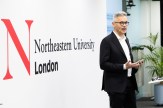The social perspective on climate change
Over the summer, Northeastern University senior Sarah Tishler asked herself what citizens of the Pacific island nation of Tuvalu would do if rising sea levels threatened to displace its modest population, as some climate-change experts predict.
“What happens to people when Tuvalu goes underwater?” said Tishler, a triple major in international affairs, psychology and French. “Are they still considered citizens? Do they move to Australia?”
Tishler’s passion for international law and issues such as global climate change led her to the Geneva Center for Security Policy, where she’s currently on co-op as a research assistant. The organization is an international training center for civil servants, diplomats and military officers from all over the world.
Tishler recently co-wrote a web editorial on why the floods in Pakistan have not resulted in mass migration. Her analysis relied on reports from the United Nations High Commissioner for Refugees and the Office for the Coordination of Humanitarian Affairs.
“We wanted to raise awareness of the issue,” said Tishler, whose editorial downplayed a lingering sentiment among members of the media that climate change would result in migration from south to north. “If your livelihood was lost in the flood,” she pointed out, “it is unlikely that you would have the resources to migrate very far at all.”
Tishler, who also conducts research on urban peacekeeping and China’s monopoly on rare earth metals, is currently writing an 8,000-word editorial on the relationship between climate change, migration and conflict. A couple of years ago, the Defense Department’s Quadrennial Defense Report called climate change a security threat.
“We’re analyzing whether climate change will push people together, and cause them to fight over resources,” said Tishler, who is using the migration patterns of victims of the Dust Bowl and Hurricane Katrina as case studies for the analysis.
As she put it, “It’s not entirely clear that climate change causes migration and migration causes conflict. We have to make sure we have all of the facts accounted for before making any policy changes to immigration, or adjusting our defense budget.”
Tishler, who’s applying to New York University School of Law, said her experiential learning opportunity has reinforced her long-term goal of becoming an international human rights lawyer for Doctors Without Borders or the Center for Constitutional Rights.
“What makes me passionate about law is its power to help people who wouldn’t normally have a voice,” said Tishler. “It gives people who wouldn’t normally be able to defend themselves a fighting chance.”





